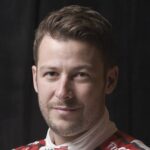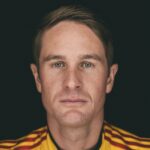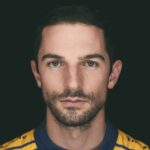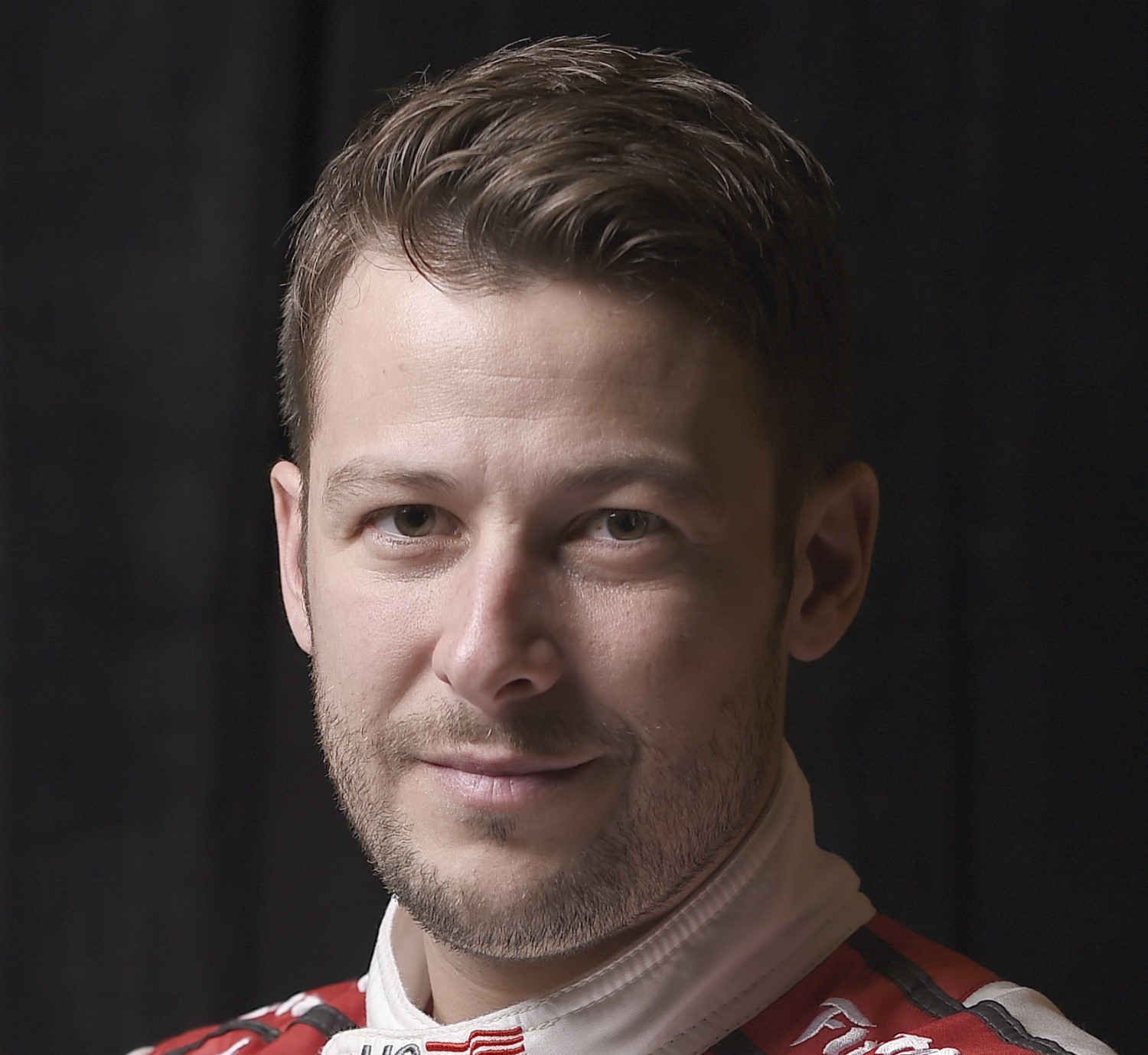Saturday morning Press Conferences from St. Pete
 |
| Marco Andretti |
Participants
Marco Andretti – Andretti Autosport
Ryan Hunter-Reay – Andretti Autosport
Alexander Rossi – Andretti Autosport
Zach Veach – Andretti Autosport
Press Conference
THE MODERATOR: Joined now by the Andretti Autosport drivers ready for the Firestone Grand Prix of St. Pete this weekend, and specifically qualifying today.
Marco, we'll start with you. You mentioned yesterday in your quote that you're fairly confident heading into qualifying that the times were similar to what you were looking for, but a red flag came out and you were happy with the lap times you were seeing before then. Take us through that practice and also what you're expecting from qualifying today.
MARCO ANDRETTI: Yeah, I mean, you want to be quickest. But I think we were on a lap to be sixth or seventh. We're trying not to overreact to the changes overnight, kind of look at it like we're sixth or seventh because we just had one turn left.
[adinserter name="GOOGLE AD"]We're a change or two away. But I think we're happy with the progress and the start. Practice one was a bit of an eye opener for everybody with the really low grip. Even the guys that were happy, it was a handful for them. The grip is slowly coming up. We'll see what practice three brings.
THE MODERATOR: Alexander, I want to give you an opportunity to take us through your practice sessions yesterday and what you're expecting from qualifying, but obviously a lot of off-track storylines going on with you, Amazing Grace and announcing a podcast with James Hinchcliffe earlier this week.
ALEXANDER ROSSI: First of all, practice yesterday was pretty good for the whole team. Obviously the pace is in the car with Ryan. I think it's just about putting it together. I think a lot of people will make a big step forward overnight.
Yesterday was very surprising for all of us. It was kind of just finding our feet, seeing what we need from the car, what we need from ourselves, how to execute, getting the lap time out of it. Today will be interesting for sure. I look forward to seeing where it all stacks up in a couple hours here.
Amazing Grace, glad it's over. Glad I had the opportunity to do it. Hopefully everyone was happy with how Conor and I represented the series. Glad we made it on 11 out of 12 episodes. Think that was a success.
Off Track with Hinch and Rossi, it's exciting. Going to replace (indiscernible) on Air in a lot better way in terms of what we're doing with guests and getting really involved in things outside of motorsports and expanding to people who are professionals in their own field, whether it's sports, arts, entertainment. I think it will be a very cool thing. All of you need to subscribe on castbox.com or wherever you listen to podcasts.
THE MODERATOR: Also joined by Zach Veach. We're hearing so much from several of the drivers, some of your fellow rookies, as well, it's a fantastic year to be a rookie in the series. Do you agree with that, especially after your first two practice sessions?
ZACH VEACH: I'd say so. Any time being a rookie in IndyCar is a good thing, right? Trying to find my way. Obviously the team is doing a great job with the cars, working on the details for me as we get more time.
Loving the experience. I've always really enjoyed St. Petersburg. It's been good to me in the past. Hoping to find a little more speed today. We should have been a little higher up.
With 24 cars, it's funny, you go from Indy Lights having eight cars, finding a gap is pretty much the easiest thing in the world, to have 24 IndyCars, it gets pretty tough.
Hopefully we have a better run this morning, find some clean track on our own. See where we're at.
THE MODERATOR: We spoke with Ryan Hunter-Reay yesterday. We'll spare you taking us through your practice session, but specifically looking forward to qualifying, what are you expecting from the field and the session in general?
 |
| Ryan Hunter-Reay |
RYAN HUNTER-REAY: The four of us got together last night, coming up with some direction changes that we want to do with the setup. That's the great thing about having four cars at Andretti Autosport that work well together, we can hopefully move forward, continue to progress.
As these guys said, I don't think anybody was really that happy with the car yesterday. It's a handful. Everybody is out there wheeling it. We have a lot of work to do today, no doubt about it. It's going to be tough to find that gap.
That's probably the toughest challenge in qualifying is to find that gap, make sure you're unimpeded throughout the run. That can be a weekend changer.
It's new for all of us. We're learning every day. It kind of does feel like an extended test session in many ways. So we'll see.
THE MODERATOR: We'll open it up for questions.
Q. Alex, last year you clearly stepped up your game. Do you think you will be able to fight for the title this year? Do you think you have the tools?
ALEXANDER ROSSI: I think I have the tools, for sure. I think the team has made a very good step forward so far from what we've seen from 2017, which was a huge improvement on 2016. I think Honda has done an amazing job with their development this winter as well.
I think, yeah, everything is shaping up that way. But you can't just say that. There's a whole lot of work ahead of us. All four of us have great cars and a great team around us. It's really up to us to execute at this point.
 |
| Alexander Rossi |
Q. Zach, you're obviously a rookie in a team with three veteran drivers. Can you describe your learning curve going into this season.
ZACH VEACH: Well, always learning. There's something to take away from three different styles every time we come off the track. I think that's a big benefit, just so much information in front of you, you just got to process it. That's been the big thing.
Just hearing these guys talk, especially as Ryan was saying at the end of the day we always get together and have big group debriefs. Just hearing what they have to say about the car goes a long way.
As a rookie, you're dealing with some things. This can't be normal. It's the same thing they're dealing with. Hearing that kind of come back and forth just helps build your confidence that that is what this car is going to be like, what you have to do with it to make it a little bit better.
Q. How much of this is going to be an evolutionary process throughout the entire season learning this car, or do you feel at some point you're going to get comfortable enough with it you're going to be able to understand what it's going to do?
ZACH VEACH: For me it's going to be an all-year process. That's just from an experience standpoint. I'll let Ryan talk about car development.
RYAN HUNTER-REAY: I hate to keep saying the same answer over and over. We don't have an idea of what we have in front of us. We've had three days as a team at Sebring turning right, now we're at St. Pete. That's it. We don't know what we're going to have at Long Beach, what we're going to have when we get to a road course.
We're all thinking about Indy. We have zero idea what to expect there. We're waiting and seeing just like all of you, and we're taking it in stride as we go. It's a moving target. Don't know.
 |
| Zach Veach |
Q. Being that the universal aero kit is new this year, I'm still not clear on what the teams can put on, take off. Are there any options for a road course setup? Is everything the same on the front and rear wing? What can you do as a team?
ALEXANDER ROSSI: You can do little things. There are parts to move around and different builds. But there's not many. I think everyone pretty much finds the best one and ends up on the same thing.
There's little things you can do. At Phoenix. Possibly once we get to a road course, like a Road America. But we haven't been there. Like Ryan said, we've only done Sebring, Phoenix and here. We haven't touched on superspeedways or road courses yet, so we're probably not the team to ask. Ask the teams that have six more days.
THE MODERATOR: Gentlemen, thank you very much. Good luck this weekend.
Chevy Press Conference
Participants
Mark Kent – Chevy IndyCar Program
Rob Buckner – New Chevy IndyCar Program Manager
Press Conference
THE MODERATOR: Thank you to the Streets of St. Petersburg and the Firestone Grand Prix of St. Petersburg and the Verizon IndyCar Series for giving Chevrolet a couple moments to come and say hi, we're back, we're excited.
We have several of our Chevrolet executives here with Jim Campbell, our vice president of racing and performance vehicles. And we have Terry Dolan, who is the director of the motorsports marketing program. We have Don (indiscernible), the senior manager of propulsion performance and racing.
Then up here on the front we have Mark Kent and the soon-to-be-introduced other person. Mark is going to take the microphone in a moment, say a few words to kick off the 2018 season, then he's going to introduce the newest member of the Chevrolet racing team in the Verizon IndyCar Series.
Mark, take it away.
MARK KENT: Good morning, everybody. Thanks for the opportunity to be with you this morning. As Judy said, I have an introduction to make, but I'm going to make a few opening comments.
Many of you know that Chevrolet is in many forms of motorsport. That's because racing offers us tremendous benefits in many ways. Technology transfer, taking what we learn on the racetrack, putting it into our production cars. We take our production car technology and put it into a race car. It is a great benefit to Chevrolet.
Also on the marketing front, being able to display our products at racetracks across the world and allowing race fans to come and look at those cars, learn about those cars, hopefully put us on their shopping list, is another great benefit.
But one of the biggest benefits we get out of performance in racing is the ability to develop our employees, identifying up-and-coming engineers, and exposing them to the fast-paced motorsports arena to hopefully hone their program management skills, hone their decision-making skills, being able to make decisions quickly and effectively.
So we use motorsports to rotate up-and-coming engineers through, we rotate them for two- or three-year assignments. Many of you probably remember Chris Berube. He was on program manager for many years. Chris came from a vehicle engineering background which was instrumental during the aero kit era of IndyCar.
But as we now transition back to the universal aero kit and the engine being the main focus going forward, we wanted to identify a program manager that had more propulsion system engine background. I'm here today to introduce that individual, Rob Buckner. He is our new Chevrolet IndyCar program manager. He's a modest individual, so I'll tell you a little bit about him.
He's very well-educated. He has a bachelors in mechanical engineering, as well as a masters in engineering, and a second masters in business administration. Very educated book-wise, but he's also a very smart person with his background within the company.
I'm going to turn it over to Rob to talk a little bit further.
ROB BUCKNER: Thanks, Mark. Good morning, everyone. I'm very excited to be back in the Verizon IndyCar Series. I spent some time here from 2013 to 2015 as a track-side support engineer, integrated into Ilmor, but as a Chevrolet employee. I was on Sebastien Bourdais's timing stand, did a lot of calibration work during that era of the car, really had a great time over here and excited to be back for another year of IndyCar.
As Mark mentioned, I have a pretty extensive engine background. I've always been in propulsion. While working at Chevrolet, I started in a validation engineering role in 2010 working on the Gen-5 V8 program which powers our Corvette and performance cars. I've always loved performance cars in racing. Once I got over to the motorsports side, worked in IndyCar, NASCAR, now back here in Mark's group. Thank you to Mark and Jim Campbell. I've had a great support group to get me to this point.
As Mark mentioned, I'm hoping to continue to develop my program management skills. I'm excited to be in a new role in motorsports for me, but leaning heavily on Mark and Chris Berube, who did a great job with this program, then all of our technical partners who do a great job in our race teams are very proud to be associated with.
Really I'm just inheriting a program that's been really successful with six straight manufacturer championships. It's a great group. I'm excited to be back.
THE MODERATOR: We'll take a few questions.
Q. Do you know how many cars you will be willing to run this coming May for the Indy 500?
MARK KENT: If history repeats itself, there's 33 cars that start. I think the last few cars have been 33 or 34 cars that have tried to start the race. Historically we've had about half the field.
I would imagine probably a 17, 17 split. If there's more cars that want to try to qualify, we're definitely in a position to support some more cars.
Q. Rob, when you look at the fact Chevrolet has won six consecutive manufacturers championships since coming back in, how important is it to keep that kind of momentum now that we're back to engines taking a priority with not the same aero differences between the two sides?
ROB BUCKNER: That's one of the things for us that's good, is we were successful since coming back to IndyCar in every formula, whether it's engine competition origin and aero kit. Working with power technical partners and race teams, we've done a great job in every formula.
We're expecting more of the same for this year. We're pretty confident we've done all of our homework and we're ready to go on the engine side.
Q. Rob, what was one and two on your get-this-done list when you were given this job, given the success this program has already had?
ROB BUCKNER: Mark did a really nice job, he handed off a packet to me. In January I kind of was able to pick up a lot of the stuff that him and Chris Berube had done. We just had some final things to take care of before going testing.
We've gone through the homologation process through this year. We've ran a lot of miles test-wise with a lot of our teams. We've been to Phoenix, Barber, Sebring. We put a fair amount of miles on our race package this year. Just starting to build that confidence, get ready for this first race.
Q. How much input do you believe you're going to have when you come to the new engine formula after the V6 era is going to change up in a couple years?
MARK KENT: We've been working hand-in-hand with both IndyCar and Honda to develop the next formula. The real goal of the next formula was to make it fair for everybody if a new manufacturer came to the series.
If you're a new manufacturer coming into the series, we didn't want to allow a new manufacturer to take what we've learned for six years now and catapult past us by watching what we've done. So we've created a new formula with IndyCar that will come out here in the future, with or without a new manufacturer. It will be one that will get us back on a level starting point so it will be a fair competition on the track when we all hit the track.
Q. I know talking to Mr. Campbell in the past, he really loved how good an aero kit Chevrolet had built from 2015 through 2017. In a lot of ways from your standpoint, was it hard to give that up in terms of how well a job it did do for the brand?
MARK KENT: As you mentioned, it was a very successful era for us. We really endorsed aero kits because it provided us two big opportunities. One, it provided us an opportunity for visual differentiation, which we got, and it also provided us an opportunity to demonstrate our engineering expertise, to out-engineer our competition. I believe, based on the results, we did that as well.
The aero kit era was very successful for us and accomplished what we were after. But in working with IndyCar, we also saw that the cost of an aero kit program was, in fact, a hurdle that was potentially keeping other engine manufacturers from entering the series.
We have aligned with IndyCar on the new universal aero kit and we hope that some more engine manufacturers come to the series because we'd love to compete with them in the showroom and on the racetrack.
Q. With the continuation of competition between Chevy and Honda maybe till 2020 or beyond, I understand on the even years you really are restricted quite a bit what you can change in the engine. Between the two manufacturers, you've kind of agreed not to do a lot of changes in the odd year because you've been with this engine for so many years, you've found everything you can find, and it would be expensive to get a little bit more performance out of it. Are the engines going to pretty much stay the same going forward? What do you anticipate the changes you can do?
ROB BUCKNER: For us, the work is never really done. If you stopped engine development because you thought there was nothing left to gain, in a pretty short period of time you wouldn't be very competitive. Our engine group does a great job of continuously searching for that last little bit of performance.
You want to be able to reuse some engine parts, get a lot of life out of them, which I think us and Honda agreed to do with limiting some changes. But we're still doing a development program and looking for all the performance we can give our teams. We'll continue to do that throughout this engine formula.
THE MODERATOR: Thank you.
